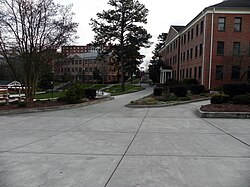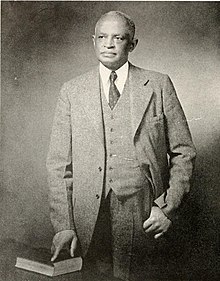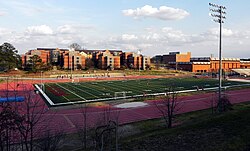North Carolina Central University
 | |
| Motto | Truth and Service |
|---|---|
| Type | Public, HBCU |
| Established | 1910 |
| Chancellor | Johnson O. Akinleye |
| Provost | Felecia Nave |
| Students | 9,224 |
| Location | Durham , North Carolina , United States |
| Campus | Urban |
| Colors | Maroon & Gray |
| Athletics | NCAA Division I |
| Nickname | Eagles |
| Affiliations | Mid-Eastern Athletic Conference |
| Website | www.nccu.edu |
 | |
North Carolina Central University | |
U.S. National Register of Historic Places | |
U.S. Historic district | |
 North Carolina Central University campus | |
 Show map of North Carolina  Show map of the United States | |
| Location | Bounded by Lawson St., Alston Ave., Nelson, and Fayetteville Sts., Durham, North Carolina |
| Coordinates | 35°58′27″N 78°53′55″W / 35.97417°N 78.89861°W / 35.97417; -78.89861Coordinates: 35°58′27″N 78°53′55″W / 35.97417°N 78.89861°W / 35.97417; -78.89861 |
| Built | 1928 |
| Architect | Atwood & Nash; Public Works Administration |
| Architectural style | Colonial Revival, Georgian Revival |
| MPS | Durham MRA |
| NRHP reference # | 86000676 [1] |
| Added to NRHP | March 28, 1986 |
North Carolina Central University (NCCU), also known as simply Central, is a public, historically black university in Durham, North Carolina. Founded by James E. Shepard in affiliation with the Chautauqua movement in 1909, it was supported by private funds from both Northern and Southern philanthropists. It was made part of the state system in 1923, when it first received state funding and was renamed as Durham State Normal School. It added graduate classes in arts and sciences, and professional schools in law and library science in the late 1930s and 1940s.
In 1969 the legislature designated this as a regional university and renamed it as North Carolina Central University. It has been part of the University of North Carolina system since 1972, and offers programs at the baccalaureate, master's, professional and doctoral levels. The university is a member-school of Thurgood Marshall College Fund.
Contents
1 History
2 Campus
3 Organization
3.1 Schools and Colleges
3.2 Research institutes
3.3 Additional programs
4 Student activities
4.1 Student organizations
4.1.1 Student media
4.2 Music and Jazz Studies
4.3 Department of History
5 Athletics
5.1 Rivals
6 Notable alumni
7 References
8 External links
History

James E. Shepard, c. 1947, founder of the National Religious Training School and Chautauqua for the Colored Race
James E. Shepard | President | 1909–1947 |
Alfonso Elder | President | 1948–1963 |
Samuel P. Massie | President | 1963–1966 |
Albert N. Whiting | President Chancellor | 1967–1972 1972–1982 |
LeRoy T. Walker | Chancellor | 1983–1986 |
Tyronza R. Richmond | Chancellor | 1986–1992 |
| Donna J. Benson | Interim Chancellor | 1992–1993 |
Julius L. Chambers | Chancellor | 1993–2001 |
James H. Ammons | Chancellor | 2001–2007 |
| Beverly Washington Jones | Interim Chancellor | 2007–2007 |
Charlie Nelms | Chancellor | 2007–2012 |
Charles Becton | Interim Chancellor | 2012–2013 |
Debra Saunders-White | Chancellor | 2013–2016 |
Johnson O. Akinleye | Interim Chancellor | 2016–2017 |
Johnson O. Akinleye | Chancellor | 2017–Present |
North Carolina Central University was founded by James E. Shepard as the National Religious Training School and Chautauqua for the Colored Race in the Hayti District. Chautauqua was an educational movement that originated in the Northeast. The school was chartered in 1909 as a private institution and opened on July 5, 1910. Woodrow Wilson, the future U.S. President, contributed some private support for the school's founding.[2]
The school was sold and reorganized in 1915, becoming the National Training School; it was supported by Margaret Olivia Slocum Sage, a philanthropist of New York who was particularly concerned about education. (She founded the Russell Sage Foundation and made generous bequests to several schools.) The National Training School supported Black teacher development in the Jim Crow era, a time when Black education was underfunded by southern states at both the lower and upper levels.

Statue of NCCU founder James E. Shepard. James E. Shepard was also a pharmacist, civil servant and educator. He served as the first president of NCCU for nearly 40 years.
Becoming a state-funded institution in 1923, this school was renamed as Durham State Normal School; normal schools trained teachers for elementary grades. In 1925, reflecting the expansion of its programs to a four-year curriculum with a variety of majors, it was renamed as the North Carolina College for Negroes. It was the nation's first state-supported liberal arts college for black students.[3] To avoid the state Jim Crow system of segregated passenger cars on trains, Shepard insisted on traveling to Raleigh by car to lobby the legislature.[3] The college's first four-year class graduated in 1929.
The college was accredited by the Southern Association of Colleges and Secondary Schools as an "A" class institution in 1937, but it was not admitted to membership until 1957. Graduate courses in the School of Arts and Sciences were added in 1939, in the School of Law in 1940, and in the School of Library Science in 1941. In 1947, the General Assembly changed the name of the institution to North Carolina College at Durham.
On October 6, 1947, Shepard, the founder and president, died. He was succeeded in 1948 by Alfonso Elder. Elder served as president until he retired September 1, 1963. Samuel P. Massie was appointed as the third president on August 9, 1963, and resigned on February 1, 1966. On July 1, 1967, Albert N. Whiting assumed the presidency, serving until his retirement June 30, 1983.
The 1969 General Assembly designated the institution as one of the State's regional universities, and the name was changed to North Carolina Central University. Since 1972, NCCU has been a constituent institution of the University of North Carolina system. On July 1, 1972, the state's four-year colleges and universities were joined to become The Consolidated University of North Carolina, with 16 individual campuses, headed by a single president and governed by the University of North Carolina Board of Governors. However, each campus was led by a separate chancellor and a campus-specific Board of Trustees.[4]
Whiting was succeeded by LeRoy T. Walker as chancellor, followed by Tyronza R. Richmond, Julius L. Chambers (who had previously been director-counsel (chief executive) of the NAACP Legal Defense and Educational Fund), James H. Ammons, Charlie Nelms, and Debra Saunders-White in 2013. Saunders-White was the first woman to hold the office on a permanent basis (Donna Benson was the first woman to serve as interim chancellor of the university).[5]
Campus
The campus is located about a mile south of downtown Durham, North Carolina and about three miles east of Duke University. Eleven buildings built before 1940 are included in a national historic district. All of the buildings, except for the three residences, are Georgian Revival-style buildings; they have contemporary fireproof construction with steel trusses and brick exterior walls. They include the Clyde R. Hoey Administration Building, Alexander Dunn Hall, Annie Day Shepard Hall, and five institutional buildings built in the late 1930s under the auspices of the Public Works Administration.[6] The campus was listed on the National Register of Historic Places in 1986.[1]

North Carolina Central University entrance seen from S. Alston Avenue.
Organization
NCCU is a part of the UNC System. The campus is governed by a thirteen-member Board of Trustees: eight elected, four appointed, and the president of the Student Government Association also serves as an ex-officio member. The Board elects its officers annually and meets five times per year.[7]
As of 2011[update], NCCU had a total of 8,587 students, (full and part-time) including 5396 full-time undergraduate and 1233 full-time graduate students. Sixty-four percent are women and 36 percent are men. Eighty-five percent are African-American, 6 percent are white, and 2 percent are Hispanic.[8] As of 2018[update], NCCU had a student faculty ratio of 16:1.[9]
Schools and Colleges
- School of Business (AACSB)
- School of Education
- School of Law
- School of Library & Information Sciences[10]
- School of Nursing
- College of Behavioral & Social Sciences[11]
- College of Arts and Sciences[12]
Research institutes
NCCU in conjunction with the African American Jazz Caucus sponsors a Jazz Research Institute which conducts an annual Summer Jazz Festival and offers a program in Jazz Studies.[13]
- Biomedical/Biotechnology Research Institute
- Biomanufacturing Research Institute and Technology Enterprise
Additional programs
- University Honors Program (UHP)
- Continuing Education
- Evening & Weekend Degree Program
Student activities

View of the NCCU campus seen from the Hoey Administration Building
Student organizations
North Carolina Central University has 130 registered student organizations and 12 honor societies.
Student media
The students of North Carolina Central University publish the Campus Echo, a bi-weekly newspaper that has been in publication since the school's founding in 1910.[14][15] The Campus Echo contains articles covering local events, arts and entertainment, and sports among other topics.
Music and Jazz Studies
North Carolina Central University's Jazz Studies program is involved with the community, providing workshops and concerts often at no charge. Headed by Dr. Ira Wiggins, NCCU's music department offers the only graduate level jazz studies degree available in North Carolina. Artists in residence of the program include Branford Marsalis and Joey Calderazzo, who provide one on one lessons as well as group workshops for everyone in the music department.
Department of History
NCCU's history department has had some success in preparing its students for doctoral study, with over 75 graduates of the history department having earned Ph.D.s in history.
Athletics
Read More: NCCU Championships
|
NCCU sponsors fourteen men's and women's sports teams that participate in the National Collegiate Athletic Association (NCAA) Division I as a newly readmitted member of the Mid-Eastern Athletic Conference. Athletic teams include football, softball, baseball, basketball, track and field, tennis, volleyball, bowling, and golf.

NCCU's O'Kelly-Riddick Stadium home to the MEAC Division I FCS Eagles

A view of the NCCU track, soccer field along with Richmond Residence Hall and the LeRoy T. Walker Physical Education Complex (far right)
Rivals
- North Carolina A&T State University
Notable alumni
| Name | Class year | Notability | Reference(s) |
|---|---|---|---|
Arenda L. Wright Allen | 1985 | judge of the U.S. District Court for the Eastern District of Virginia | |
Sunshine Anderson | singer | ||
Louis Austin | newspaper publisher | ||
Dorothy F. Bailey | 1962 | civic leader, Maryland Women's Hall of Fame inductee | [16] |
Frank Ballance | 1963 | former member of the U.S. House of Representatives (North Carolina 1st district) | |
Ernie Barnes | 1960 | artist and former professional football player | |
Larry Black | Olympic track & field gold and silver medalist | ||
Dan Blue | multiple African-American "firsts": North Carolina Speaker of the House; president of National Conference of State Legislatures | ||
Herman Boone | 1958 | former high school football coach, profiled in the motion picture Remember the Titans | |
Julia Boseman | 1992 | State Senator (North Carolina) | |
Jim Brewington | former professional football player | ||
Wanda G. Bryant | 1982 | North Carolina Court of Appeals jurist | |
G. K. Butterfield | 1974 | Congressman and former Associate Justice, North Carolina Supreme Court | |
Phonte Coleman | rapper | ||
Kim Coles | comedian and actress | ||
Julius L. Chambers | 1958 | lawyer, civil rights leader, and educator. Founded the first integrated law firm in North Carolina | |
Eva M. Clayton | former member of the U.S. House of Representatives (North Carolina's 1st district) | ||
Lee Davis | 1968 | former professional basketball player, 1-time ABA all-star | [17] |
Ivan Dixon | 1954 | actor, Hogan's Heroes | |
Patrick Douthit ("9th Wonder") | attended | Grammy award-winning hip-hop producer, college lecturer and former teaching fellow at Harvard University | |
Mike Easley | 1976 | former Governor of North Carolina | |
Rick Elmore | 1982 | North Carolina Court of Appeals jurist | |
Willie E. Gary | 1974 | attorney, motivational speaker and cable television executive | |
Bill Hayes | 1965 | former head football coach at Winston Salem State University and North Carolina A&T State University; current athletic director at Winston-Salem State University | |
Harold Hunter | first African-American to sign a contract with the NBA; former coach for Tennessee State, player for North Carolina College | [18] | |
Maynard Jackson | 1964 | first black mayor of Atlanta, Georgia. Graduate of NC Central University School of Law | |
Sam Jones | NBA Hall of Famer | ||
Vernon Jones | politician and former chief executive officer of Dekalb County, Georgia | ||
Eleanor Kinnaird | Member of the North Carolina Senate (23rd district) | ||
Clarence Lightner | First black mayor of Raleigh, N.C. | ||
Bishop Eddie Long | Senior Pastor, New Birth Missionary Baptist Church, Lithonia, Georgia | ||
Lillian M. Lowery | Superintendent of the Maryland State Department of Education | ||
Jeanne Lucas | first black elected to the North Carolina Senate | ||
Robert Massey | 1989 | former NFL defensive back and current head football coach at Shaw University | |
Henry "Mickey" Michaux | member of the North Carolina House of Representatives (31st district) | ||
LeVelle Moton | 1996 | former NC Central basketball player and current head coach of the men's basketball team | |
April Parker Jones | television and film actress | ||
Greg Peterson | 2007 | former professional football player | |
Xavier Proctor | 2013 | football player | |
Charles Romes | 1977 | former professional football player | |
Ben Ruffin | 1964 | civil rights activist, educator, and businessman | |
Julius Sang | former Kenyan track athlete | ||
Richard Sligh | 1966 | professional football player-Oakland Raiders (California) and Cincinnati "Bengals" (Ohio); "Tallest Pro Football Player" | |
Ted G. Stone | M.A. 1958 | Southern Baptist evangelist and recovered amphetamine addict | |
André Leon Talley | Editor-at-Large, Vogue Magazine | ||
Cressie Thigpen | 1968 | North Carolina Court of Appeals jurist | |
Doug Wilkerson | former professional football player | ||
Paul Winslow | former professional football player | ||
Yahzarah | attended | singer | |
David Young | former professional basketball player | ||
Ernie Warlick | former AFL and CFL professional football player |
References
^ ab National Park Service (2009-03-13). "National Register Information System". National Register of Historic Places. National Park Service..mw-parser-output cite.citation{font-style:inherit}.mw-parser-output .citation q{quotes:"""""""'""'"}.mw-parser-output .citation .cs1-lock-free a{background:url("//upload.wikimedia.org/wikipedia/commons/thumb/6/65/Lock-green.svg/9px-Lock-green.svg.png")no-repeat;background-position:right .1em center}.mw-parser-output .citation .cs1-lock-limited a,.mw-parser-output .citation .cs1-lock-registration a{background:url("//upload.wikimedia.org/wikipedia/commons/thumb/d/d6/Lock-gray-alt-2.svg/9px-Lock-gray-alt-2.svg.png")no-repeat;background-position:right .1em center}.mw-parser-output .citation .cs1-lock-subscription a{background:url("//upload.wikimedia.org/wikipedia/commons/thumb/a/aa/Lock-red-alt-2.svg/9px-Lock-red-alt-2.svg.png")no-repeat;background-position:right .1em center}.mw-parser-output .cs1-subscription,.mw-parser-output .cs1-registration{color:#555}.mw-parser-output .cs1-subscription span,.mw-parser-output .cs1-registration span{border-bottom:1px dotted;cursor:help}.mw-parser-output .cs1-ws-icon a{background:url("//upload.wikimedia.org/wikipedia/commons/thumb/4/4c/Wikisource-logo.svg/12px-Wikisource-logo.svg.png")no-repeat;background-position:right .1em center}.mw-parser-output code.cs1-code{color:inherit;background:inherit;border:inherit;padding:inherit}.mw-parser-output .cs1-hidden-error{display:none;font-size:100%}.mw-parser-output .cs1-visible-error{font-size:100%}.mw-parser-output .cs1-maint{display:none;color:#33aa33;margin-left:0.3em}.mw-parser-output .cs1-subscription,.mw-parser-output .cs1-registration,.mw-parser-output .cs1-format{font-size:95%}.mw-parser-output .cs1-kern-left,.mw-parser-output .cs1-kern-wl-left{padding-left:0.2em}.mw-parser-output .cs1-kern-right,.mw-parser-output .cs1-kern-wl-right{padding-right:0.2em}
^ James Edward Shepard to Woodrow Wilson, October 2, 1909, in Arthur S. Link, ed., The Papers of Woodrow Wilson, Volume 19, pp. 399-400.
^ ab Channing, Steven (2009-04-01). "John Hope Franklin, 1915-2009". Independent Weekly.
^ "Board of Trustees". Retrieved 2010-11-12.
^ Platt, Wes (February 8, 2013). "The stars kind of collided". Durham Herald-Sun. Archived from the original on 2014-04-15. Retrieved April 14, 2014.
^ Claudia Roberts Brown (June 1984). "North Carolina Central University" (PDF). National Register of Historic Places - Nomination and Inventory. North Carolina State Historic Preservation Office. Retrieved 2014-10-01.
^ "About the Board". NCCU. Retrieved 2010-11-13.
^ "North Carolina Central University College Portrait". Retrieved 2010-11-13.
^ "North Carolina Central University". U.S. News and World Report.
^ "School of Library and Information Sciences". Nccuslis.org. Retrieved 2015-07-28.
^ "Welcome". Nccu.edu. Retrieved 2015-07-28.
^ "College of Arts and Sciences". Nccu.edu. Retrieved 2015-07-28.
^ "NAJRI: NCCU AAJC Research Institute". NCCU. Archived from the original on 2008-04-13. Retrieved 2010-11-13.
^ Echo Staff. "About the Campus Echo". Archived from the original on 2012-05-11. Retrieved 1 August 2012.
^ Digital NC. "North Carolina Central University Newspapers". digitalnc.org/. Digital NC. Retrieved 1 August 2012.
^ "Dorothy F. Bailey". Maryland Women's Hall of Fame. Maryland State Archives. Retrieved July 8, 2016.
^ "Lee Davis Statistics". Sports Reference, LLC. Retrieved 2009-03-24.
^ "Former Tennessee State basketball coach Harold Hunter dies". The City Paper. 2013-03-07. Archived from the original on 2013-11-02. Retrieved 2013-03-30.
External links
| Wikimedia Commons has media related to North Carolina Central University. |
- Official website
- NCCU Athletics website



